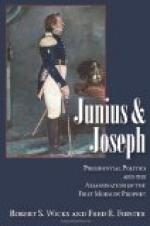“I write to you, my dear cousin, rather than to my aunt, to whom I fear my letter would not be acceptable, for although I can say that I regret my wilfulness and the manner of my disobedience, still I can never regret that, having been forced to choose, I threw in my lot with those who can suffer wrong rather than with those who have it in their hearts to inflict wrong, for if there be a God—ah, Ephraim, this is another reason why I address you, for I am in sore doubt concerning the knowledge of God, as to whether any knowledge is possible. My husband, who denies me nothing, has allowed me to send for some of your books whose names I remembered. I thought at first to write to you about them, but I distrust now my own understanding too much to venture. I would like you to know that they have helped me somewhat, for I do not now say to myself in hard, tearless fashion that I know there is no God, to which thought I was driven by the reflection that most of those who seek him most diligently sow the wind and reap the whirlwind.
“But the more immediate occasion of this letter is to tell you that a month since Mr. Finney held a meeting not far from us. I went, thinking to gain some help from him, and to hear news of you, but I was greatly disappointed, and made very angry. He preached as my husband and many of our elders preach, and there were among the crowd the same signs of excitement and peculiar manifestations that we have constantly among us. But toward the end of his sermon Mr. Finney spoke of my husband’s Church, and he lent the weight of his influence to very evil slanders that are constantly repeated about us by those who have not sought to know the truth. He did us great injury by stirring up the roughest of the people to violence. Mr. Finney will, I suppose, visit you and repeat those lies, which no doubt he believes, but is most culpable in believing, because he has not investigated the scandal against us as he would have investigated scandal against any who are orthodox. I write now to tell you that that which he says is not true. For although there are a few criminals amongst us, as in every community, evil is not taught or condoned.”
As Finney read this letter by his lonely candle he was so far stirred by what he deemed the merely human side of the incident as to say to himself, “Poor Ephraim! She has never even known that he loved her.” But next day, in speaking to Ephraim, he pointed out that in the worst communities there were always pure-minded women who knew little or nothing of the evil around them, and said he believed that his message would still be the means of bringing home the truth to Susannah’s heart.
CHAPTER VI.
In the meantime an interval of comparative peace had come to Kirtland. The Gentiles, because they discovered that the town was a good market for the produce of more fields than the Saints could till, allowed their religious zeal to slumber.




